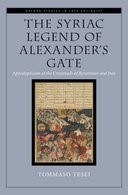Tesei (Tommaso), The Syriac Legend of Alexander’s Gate: Apocalypticism at the Crossroads of Byzantium and Iran, Oxford, Oxford University Press, ("Oxford Studies Late Antiquity"), 2024, 240 p. ISBN 978-0197646878
Author
Tommaso Tesei is Associate Professor of Religious Studies at Duke Kunshan University.
Presentation

The Syriac text entitled Neshana d-Aleksandros (also known as Syriac Alexander Legend) is a seminal text for late Christian and Muslim apocalyptic traditions. Containing the earliest recorded versions of literary motifs that would become central to the medieval apocalyptic tradition, it represents an early witness to an influential political ideology that guided both Byzantine and early Islamic imperial policies. While the scholarly consensus commonly dates the Neshana to the time of Heraclius (r. 610-641 CE), in this book author Tommaso Tesei argues that an earlier version of the text was produced during the reign of Justinian I (r. 527-565). This new historical contextualization of the text enables us to better delineate the role of the Neshana in the development of late antique, politicized, forms of apocalypticism, which assign to the Christian Roman Empire the task of establishing a cosmocratic rule in view of Jesus’ Second Coming.
In analyzing the contents and the ideology of this seminal text, this volume contributes to our understanding of the origins and developments of important literary motifs of Medieval literature worldwide, such as the characterization of Alexander as a pious prophet-king and the story of the gate that he erected to confine the eschatological nations of Gog and Magog. The Syriac Legend of Alexander’s Gate sheds light on lesser-known aspects of political debates in the sixth-century Near East and offers historians a valuable insight into important aspects of Justinian’s reign.
